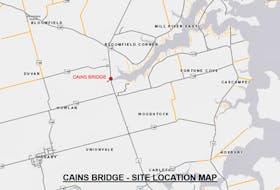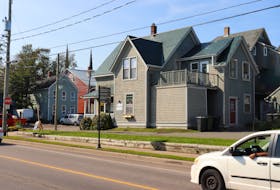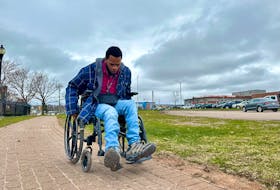CHARLOTTETOWN, P.E.I. — Council was put in the hot seat when it came face to face with some of the residents affected by the city’s housing crisis Wednesday night.
More than 100 renters, homeowners and others with a stake in Charlottetown’s housing market attended a public consultation at the Confederation Centre of the Arts, which was a chance to provide feedback for council in creating regulations around short-term rentals such as Airbnb.
Liz Keenan choked back tears as she described the difficulty of not being able to find an affordable apartment. She also described the complications of job-searching without a fixed address.
“Please get us housing,” said Keenan. “I want to get a job. I want to work, but I can’t if I’m homeless.”
Jason Alward, a member of P.E.I. Fight for Affordable Housing, said he found the city’s short-term rental survey “laughably one-sided” towards Airbnb operators.
“We did our own (survey), because there are social issues that certainly the (city’s) survey did not address,” said Alward, who asked for councillors to publicly state whether they had any short-term rentals. “Because it does seem a little one-sided … it seems to me, the last two to three years, very little has been done.”
While Mayor Philip Brown initially hesitated on whether council should answer the question, emphasizing the night was to hear residents’ concerns, all members stated they were not involved in short-term rentals.
Brown also said while the issue has been ongoing for several years, council has taken it “head-on.”
“But it’s not over yet, this is just part of the process,’ said Brown. “We’re here to gather information.”
That information, along with the survey results, will go towards drafting a bylaw.
City planner Robert Zilke presented results from that survey Wednesday while noting the housing shortage was not largely caused by short-term rentals.
Through figures from the Canada Mortgage and Housing Corporation, Statistics Canada and the city’s building permits, Zilke showed that while P.E.I.’s population has steadily increased, a construction decline in 2014 and 2015 is still having an impact.
“We are rising from it but we’re still not meeting the pace of demand in growth,” said Zilke. “Short-term rentals albeit have an impact on the housing supply, availability and affordability, but there are greater forces at work here as well. We have a situation where the (development) industry is not matching growth.”
While some called for more public-funded housing during the meeting, the most common suggestion seemed to be for restricting Airbnb to owner-occupied residences.
Gabrielle Ayles said was in favour of owner-occupied residences, noting that Airbnb was originally created as a sharing platform. Ayles knows several low-income homeowners who are able to support themselves by renting out a room in the summer.
“And I think that’s really valuable,” said Ayles. “The problem I see with it, is where we have people who have taken advantage of the lack of regulatory framework around Airbnbs to operate essentially hotels.”
Ayles also pointed to other municipalities which passed similar regulations.
“It’s a fairly common-sense solution that protects low-income residents while allowing homeowners to still make some extra income.”
Survey results
- Charlottetown’s short-term rental survey received 746 unique responses. 607 responses were from full-time residents, with 219 identifying as an owner and 227 as a renter.
- The majority, about 76 per cent, said they did not plan to advertise their home as a short-term rental. 12 per cent said they had not advertised it but were considering it, while 11 per cent had advertised.
- Respondents said the most common impact felt from short-term rentals has been a decrease in the housing supply for local renters and higher prices for renters and buyers.
- The most popular answer for how the city should regulate short-term rentals and protect the housing supply was to apply the same regulations hotels and bed and breakfast operations adhere to. The second-most popular suggestion was to limit short-term rentals to single detached dwellings.
One bed and breakfast operator said her business has suffered from those taking advantage of Airbnb by buying up residential properties to rent. She also noted those short-term rentals were not held to the same standard as her own operations, creating an uneven playing field.
Even some who operated Airbnbs called on the city to enforce stricter regulations.
Frank MacEachern, who rents his home out for three months of the year, said he saw value in Airbnb. He said it allows residents to be able to afford to stay in their homes, especially for young homeowners.
“There’s no doubt about that. There’s also no doubt it needs to be controlled,” said MacEachern. “Council has to look at ensuring standards are there and that the character of neighbourhoods are not changing.”
Ainsley Kendrick, another member of P.E.I. Fight for Affordable Housing, said council must also include enforcement as part of the regulations.
“Whatever it is you decide, put in your plan how it’s going to be enforced and act on that,” said Kendrick. “Don’t slap something on a piece of paper and say, ‘oh, we did a great thing’.”
More information on the survey can be obtained by emailing [email protected].








